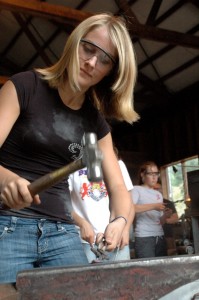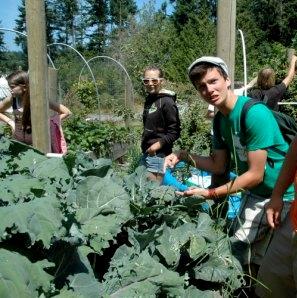Summer agricultural program for teens — and adults — start up again
Once again, the gardens and fields of Orcas will yield rhubarb, lettuce, broccoli, garlic, tomatoes, potatoes, and flowers — and zucchini. And once again, the farmers, blacksmiths, beekeepers, myco-remediators, and animal husbandry folks will be sharing their knowledge at FEAST, the “Farm Education and Sustainability for Teens” summer program.
This will be the fourth year of the high-school credit class that incorporates hands-on learning with the academic study of the whole picture of farming, gardening, preserving, repairing and sustaining Mother Earth.
This year, FEAST founders Rusty Diggs and Christopher Evans are coordinating the program. Last week they spoke at the public high school, giving local kids information and encouragement to deepen their relationship with food production.
Partnership with the Funhouse enables adults to learn along with the kids, as individual classes will be open to the general population, depending on space availability.
Kari Schuh, Orcas School District teacher who is also the Director of the Career and Tech Ed program, sheparded the program with many volunteer hours its first year. She also designed the program so that high school credit could be earned. Now, the summer course is offered to teens (beginning with current 9th graders) for high school credit, either as a required vocational course, or as an elective in general agriculture.
As in summers past, students in the FEAST program will study the science and practices of agriculture such as bee-keeping, wild crafted medicines, mycology, farming, “rocket stoves,” blacksmithing, woodworking, solar energy, biodynamic farming, composting, permaculture, soil science, food preservation, natural building and more.
Christopher and Rusty are coordinating the collaborative efforts in teaching, transportation, supplies, outreach and administration. While the teaching element of the program is 90 percent volunteer, the organization is the most difficult part, they say. “Having the community know what’s happening translates into support and helps students to see that their involvement is valued.”
Those interested in helping with any aspect of the program are welcomed to call Rusty at 376-4486.
The pair credits Kari Schuh’s involvement as critical. Schuh says, she plans to be involved “as much as possible.” The school reimburses her on an hourly basis.
“The FEAST program is definitely a collaborative venture,” Schuh says.” It is a program that will teach lifelong skills, build relationships within the community and provide a relevant connection between science, reading and writing.”
Rusty and Christopher are strong advocates for the “farm local, buy local” ethic.
“The more we can get from island resources to teach the kids and help them to use those resources here so that we’re not importing food, builders and workers from the mainland, the greater value the program imparts. If we invest in our people, rather than go off-island, we can take care of each other and be sustainable and give kids hope for their future,” says Christopher.
Rusty adds, “And if we have the resources set up, if something happens as it did in Haiti or Japan, we have a system together that takes care of us.”
As in years past, the program will start in mid-June, after the academic school year ends. It can best operate with about 12 students, and with no less than eight. A materials fee of $200 is charged, and scholarships are available through the Funhouse for teens. “No one is turned away,” says Rusty, and each year, about a quarter of the kids receive some scholarship.
Adults who are interested in signing up for individual classes can call the Funhouse at 376-7177.
To help, call Rusty Diggs at 376-4486. To learn more about FEAST, go to www.feastprogram.org
**If you are reading theOrcasonian for free, thank your fellow islanders. If you would like to support theOrcasonian CLICK HERE to set your modestly-priced, voluntary subscription. Otherwise, no worries; we’re happy to share with you.**









